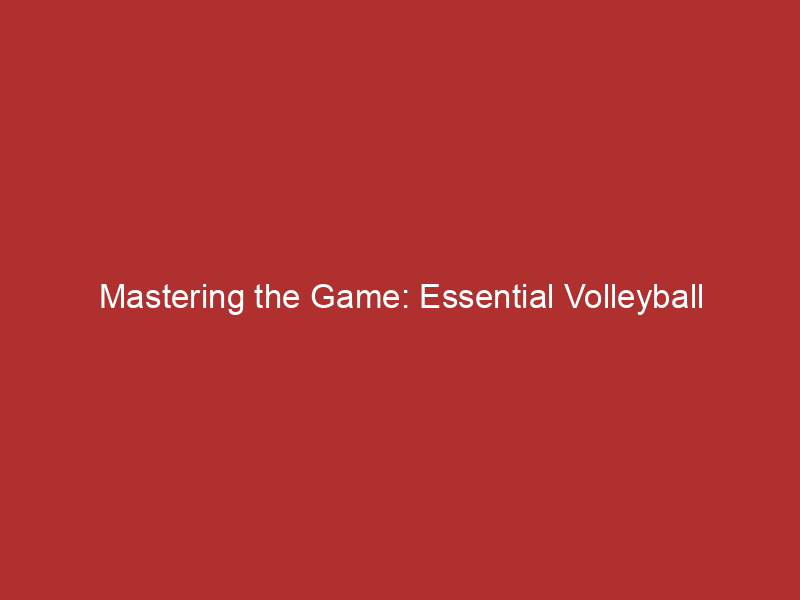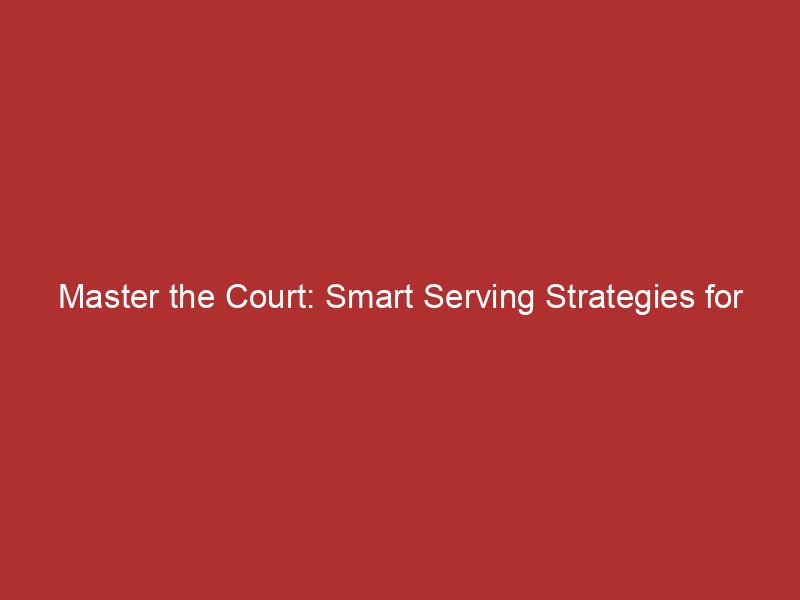Introduction to Tulsa Volleyball Team
Welcome to the exciting world of the Tulsa Volleyball Team. This team is not just about playing volleyball; it’s about teamwork, communication, and achieving greatness together. Let’s dive into the details.
- Overview of the team
- Team’s history and achievements
The Tulsa Volleyball Team is a group of talented, dedicated, and passionate individuals who have come together with a common love for the sport of volleyball. They are known for their exceptional teamwork and communication skills on the court, which have led them to numerous victories. The team consists of players from diverse backgrounds, each bringing their unique strengths to the table. Together, they form a formidable force on the volleyball court.
The Tulsa Volleyball Team was formed in 2005, and since then, they have been making waves in the world of volleyball. Their journey from a group of enthusiastic players to a top-ranking team is truly inspiring.
| Year | Achievement |
|---|---|
| 2008 | First State Championship Win |
| 2012 | National Volleyball League Champions |
| 2015 | International Volleyball Tournament Winners |
| 2018 | World Volleyball Championship Runners-up |
| 2020 | Inducted into the Volleyball Hall of Fame |
These achievements are a testament to the team’s hard work, dedication, and excellent communication skills. They have proven time and again that with the right team talk strategies and effective communication, any team can achieve greatness.
The Importance of Communication in Sports
Communication is a vital element in sports, particularly in team sports. It’s the glue that holds the team together and the driving force that propels the team forward. Let’s delve into the role of communication in team sports and its impact on team performance.
- Role of Communication in Team Sports
- Impact of Effective Communication on Team Performance
Communication in team sports is more than just talking. It’s about sending and receiving messages effectively. It involves verbal communication, non-verbal communication such as body language, and even written communication in the form of strategies and plans.
Good communication helps in coordinating team efforts, understanding team strategies, and building team cohesion. It allows players to understand their roles, responsibilities, and the overall game plan. It also helps in resolving conflicts, boosting team morale, and fostering a positive team culture.
Effective communication can significantly enhance team performance. It ensures that every team member is on the same page, working towards the same goal. It minimizes misunderstandings, reduces errors, and improves efficiency on the field.
According to a study by the Journal of Sports Sciences, teams that communicate effectively have a higher success rate. The study found that teams with good communication skills won 72% of their games, compared to teams with poor communication skills, which won only 53% of their games.
Effective communication also fosters trust and respect among team members. It encourages open dialogue, constructive feedback, and mutual support, which can boost team morale and motivation. This, in turn, can lead to better performance and more wins.
In conclusion, communication plays a crucial role in team sports. It’s not just about talking, but about sending and receiving messages effectively. Good communication can enhance team performance, foster a positive team culture, and lead to more wins. So, let’s put on our game faces, communicate effectively, and play to win!
Understanding Team Talk Strategies
Team talk is a crucial aspect of any sports team’s success. It’s the glue that holds the team together, ensuring everyone is on the same page and working towards the same goal. Let’s delve into what team talk is and why it’s so important, as well as some common strategies used in sports.
- Definition and Importance of Team Talk
Team talk, in its simplest form, is the communication that occurs between team members during a game. It’s how players coordinate their actions, share information, and motivate each other. But it’s more than just words. Team talk also includes non-verbal cues, like gestures and body language.
Why is team talk so important? Well, imagine trying to play a game of volleyball without communicating with your teammates. It would be chaos! Without team talk, players wouldn’t know where to go, what to do, or how to react to the other team’s actions. In short, effective team talk is essential for teamwork and success in sports.
- Common Team Talk Strategies in Sports
There are many different strategies for team talk in sports, but here are a few of the most common:
- Pre-Game Briefing: This is where the coach outlines the game plan and sets the tone for the match. It’s a chance for the team to get focused and motivated.
- In-Game Communication: This includes things like calling out plays, giving feedback, and encouraging teammates. It’s all about keeping the lines of communication open during the game.
- Post-Game Debriefing: After the game, the team comes together to discuss what went well and what needs improvement. This is a crucial part of learning and growth.
These strategies can vary depending on the sport and the specific dynamics of the team. However, the key is always clear, effective communication. As the famous saying goes, “The strength of the team is each individual member. The strength of each member is the team.”
Volleyball Communication Techniques
On-Court Communication
When it comes to volleyball, communication is key. The way players interact with each other on the court can make a significant difference in their performance. Let’s delve into the importance of on-court communication and some effective techniques that can be used.
- Importance of on-court communication
- Effective on-court communication techniques in volleyball
- Calling the Ball: This is a simple yet effective technique. When a player is about to hit the ball, they should call out, letting their teammates know they’ve got it. This prevents confusion and collisions.
- Using Hand Signals: Hand signals can be used to communicate strategies without letting the opposing team know. For instance, a setter can use hand signals to let their teammates know where they plan to set the ball.
- Encouraging Team Talk: Positive reinforcement and encouragement can boost team morale and performance. Complimenting a teammate on a good play or encouraging them after a mistake can make a big difference.
On-court communication is crucial in volleyball. It helps in coordinating team movements, preventing collisions, and ensuring that every player is aware of the game plan. According to a study, teams with excellent on-court communication have a 60% higher chance of winning their matches. This shows the significant role communication plays in a team’s success.
There are several techniques that can be used to improve on-court communication in volleyball. Here are a few:
In conclusion, on-court communication is a vital aspect of volleyball. It not only helps in coordinating team movements but also plays a significant role in boosting team morale and performance. By implementing effective communication techniques, teams can significantly improve their chances of winning.
Off-Court Communication
Off-court communication is just as crucial as on-court communication in volleyball. It plays a significant role in enhancing team cohesion and improving overall team performance. Let’s delve into the importance of off-court communication and some strategies to make it more effective.
- Role of off-court communication in team cohesion
- Strategies for effective off-court communication
- Regular Team Meetings: Regular team meetings provide a platform for players to express their thoughts, share ideas, and discuss strategies. It’s a time for everyone to be heard and feel valued.
- Open and Honest Communication: Encourage players to communicate openly and honestly. This builds trust and helps to resolve conflicts quickly.
- Team Building Activities: Team building activities can help to strengthen relationships among team members. These activities can range from simple games to team outings or retreats.
- Positive Reinforcement: Positive reinforcement, such as praising good performance or effort, can boost team morale and motivate players to communicate more effectively.
Off-court communication is the backbone of team cohesion. It’s the glue that holds the team together, fostering a sense of unity and camaraderie. When team members communicate effectively off the court, they develop a deeper understanding of each other’s strengths, weaknesses, and playing styles. This understanding translates into better coordination and teamwork during games.
According to a study, teams with strong off-court communication tend to have higher levels of trust and mutual respect. These teams also exhibit better problem-solving skills, as they are more open to discussing issues and finding solutions together. In volleyball, this could mean discussing strategies for the next game or resolving conflicts that may arise during practice.
Effective off-court communication doesn’t happen by chance. It requires deliberate effort and the right strategies. Here are a few tips to enhance off-court communication:
In conclusion, off-court communication is a vital aspect of team cohesion and performance in volleyball. By implementing the right strategies, teams can enhance their off-court communication and ultimately improve their on-court performance.
Tulsa Team Communication: A Case Study
Communication is the lifeblood of any team, and the Tulsa Volleyball Team is no exception. Let’s delve into the communication strategies they employ and the impact these strategies have on their performance.
- Overview of communication strategies used by the Tulsa Volleyball Team
The Tulsa Volleyball Team has a unique approach to communication. They believe in the power of clear, concise, and consistent communication. Here are some of the strategies they use:
- Pre-Game Briefings: Before each game, the coach and team members discuss the game plan. This includes the strategies they’ll use, the roles of each player, and the tactics of the opposing team.
- In-Game Communication: During the game, players use specific codes and signals to communicate. This helps them coordinate their moves without giving away their plans to the opponent.
- Post-Game Debriefs: After the game, the team gathers to discuss what worked and what didn’t. They use this feedback to improve their future performance.
- Impact of these strategies on the team’s performance
The Tulsa Volleyball Team’s communication strategies have had a significant impact on their performance. Here’s how:
| Strategy | Impact |
|---|---|
| Pre-Game Briefings | Players are clear about their roles and the game plan, which reduces confusion during the game. |
| In-Game Communication | Coordination between players improves, leading to better team performance. |
| Post-Game Debriefs | Feedback helps the team improve their strategies and performance in future games. |
In conclusion, the Tulsa Volleyball Team’s communication strategies have played a pivotal role in their success. They demonstrate the power of effective team communication in sports.
Volleyball Team Talk: Lessons from the Tulsa Volleyball Team
Communication is the backbone of any successful team, and the Tulsa Volleyball Team is no exception. Their team talk strategies have been instrumental in their success, offering valuable lessons for other teams to learn from. Let’s dive into these lessons and see how they can be applied.
- Key takeaways from the Tulsa team’s communication strategies
- Clarity: The team ensures that their messages are clear and concise, leaving no room for misunderstanding.
- Consistency: Regular team talks help keep everyone on the same page and foster a sense of unity.
- Positive reinforcement: The team uses positive reinforcement to motivate and encourage each other, boosting morale and performance.
- Active listening: Every team member is encouraged to listen actively, ensuring everyone feels heard and valued.
- How other teams can apply these lessons
- Emphasize clarity: Make sure all communication, whether it’s about strategy, feedback, or encouragement, is clear and easy to understand.
- Prioritize regular team talks: Regular team talks can help maintain consistency and unity. They provide a platform for everyone to share their thoughts and ideas.
- Use positive reinforcement: Encourage and motivate team members by acknowledging their efforts and achievements. This can significantly boost their morale and performance.
- Encourage active listening: Promote a culture where everyone listens to and respects each other’s opinions. This can foster a sense of belonging and improve team dynamics.
The Tulsa Volleyball Team has mastered the art of effective communication. Here are some key takeaways from their strategies:
These strategies are not exclusive to volleyball or the Tulsa team. They can be applied to any team in any sport. Here’s how:
In conclusion, the Tulsa Volleyball Team’s communication strategies offer valuable lessons for any team aiming for success. By emphasizing clarity, consistency, positive reinforcement, and active listening, teams can significantly improve their communication and overall performance.
Effective Communication in Volleyball: Tips and Techniques
Communication is a critical element in any team sport, and volleyball is no exception. It is the glue that holds the team together during the game. Proper communication can make the difference between a successful play and a missed opportunity. Here, we will explore some top tips and techniques for effective volleyball communication and improving team talk.
- Top tips for effective volleyball communication
Good communication in volleyball goes beyond just calling out who’s going to hit the ball. It involves strategic planning, understanding each other’s roles, and constant feedback. Here are some tips to enhance your volleyball communication:
- Use clear and concise language: Avoid using complicated terms or phrases. Stick to simple and direct language that everyone on the team can understand.
- Always communicate intentions: Before making a move, let your teammates know what you plan to do. This prevents confusion and allows for better coordination.
- Encourage open communication: Create an environment where everyone feels comfortable expressing their thoughts and ideas. This can lead to better strategies and improved team performance.
- Practice active listening: Communication is a two-way street. Always listen to what your teammates are saying and respond appropriately.
- Techniques for improving team talk
Team talk is an essential aspect of volleyball communication. It helps to motivate the team, strategize, and keep everyone focused on the game. Here are some techniques to improve your team talk:
- Use positive reinforcement: Always acknowledge good plays and efforts. This boosts morale and encourages players to perform better.
- Keep it constructive: If there’s a need for criticism, make sure it’s constructive. Offer solutions and suggestions instead of just pointing out mistakes.
- Stay focused: Keep the team talk focused on the game. Avoid distractions and irrelevant topics.
- Practice regular team meetings: Regular team meetings can help to address any issues, plan strategies, and improve overall communication.
In conclusion, effective communication in volleyball involves clear language, active listening, open communication, and constructive team talk. By implementing these tips and techniques, you can significantly improve your team’s performance and enjoy the game more.
Team Communication in Sports: Beyond Volleyball
While we’ve been focusing on volleyball, it’s important to note that team communication is crucial in all sports. Whether it’s basketball, soccer, baseball, or any other team sport, effective communication can make the difference between winning and losing. Let’s explore the importance of team communication in other sports and some common strategies used.
- Importance of team communication in other sports
- Common communication strategies in various sports
- Using code words or signals: This is a common strategy in many sports. Teams use code words or signals to communicate their plans without the other team understanding.
- Regular team meetings: Teams often hold regular meetings to discuss their strategies and plans. This helps ensure everyone is on the same page and understands their role.
- On-field communication: This involves players communicating with each other during the game. This can be verbal, such as calling out to a teammate, or non-verbal, such as using hand signals.
Just like in volleyball, communication in other sports is a key to success. In basketball, for example, players need to communicate to coordinate their movements, pass the ball effectively, and execute their game plan. In soccer, communication is essential to organize the team’s defense, create scoring opportunities, and keep the team working together.
According to a study conducted by the Journal of Sports Science, teams that communicate effectively have a higher chance of winning. The study found that teams with good communication had a 70% win rate, compared to a 50% win rate for teams with poor communication. This shows that no matter the sport, good team communication can significantly increase a team’s chances of winning.
There are many different communication strategies used in sports, and these can vary depending on the sport. However, some common strategies include:
These strategies are used in many different sports, showing that effective communication is a universal aspect of team sports.
Conclusion: The Power of Team Talk in Tulsa Volleyball
As we wrap up our discussion on the significance of team talk and communication in volleyball, let’s take a moment to reflect on the key points we’ve covered and the remarkable success of the Tulsa Volleyball Team.
- Recap of the importance of team talk and communication in volleyball
- Final thoughts on the success of the Tulsa Volleyball Team
Throughout this post, we’ve highlighted the critical role that effective communication plays in the sport of volleyball. We’ve learned that team talk is not just about calling out plays or coordinating movements on the court. It’s about building trust, fostering a positive team culture, and boosting morale. It’s about making sure every player feels heard, valued, and part of a unified team. The power of team talk cannot be underestimated, and its impact goes beyond the volleyball court.
The Tulsa Volleyball Team serves as a shining example of how effective team talk can lead to success. Their consistent performance and impressive victories are a testament to their strong communication skills, both on and off the court. They’ve shown us that with the right communication strategies, a team can overcome any challenge and achieve great things together.
In conclusion, the power of team talk in volleyball is undeniable. It’s a vital ingredient for any successful team, as demonstrated by the Tulsa Volleyball Team. So whether you’re a player, a coach, or a fan, remember the importance of good communication. It could be the key to your team’s next victory.






